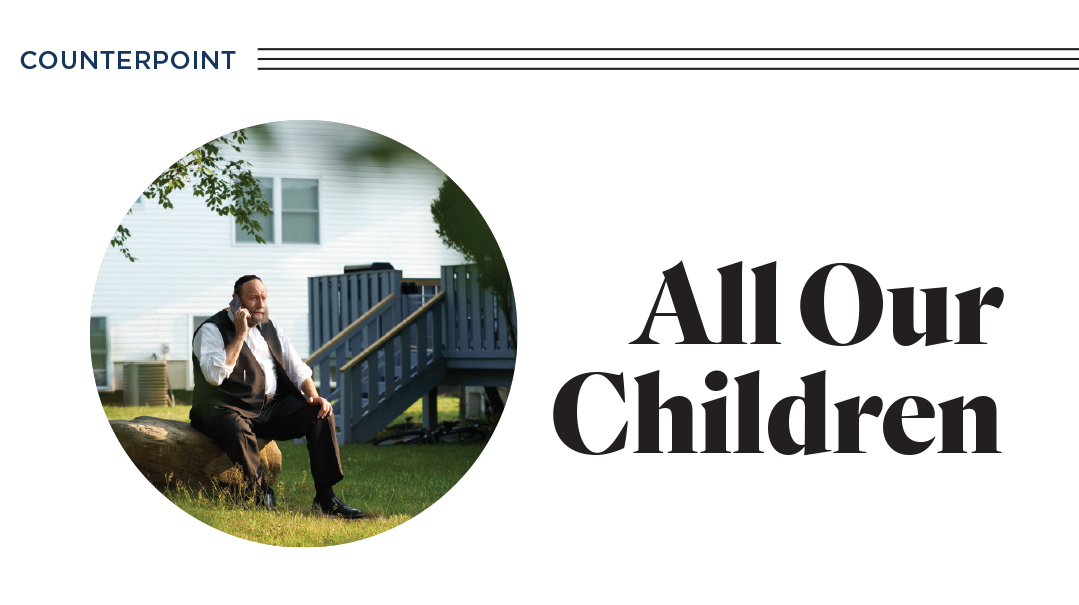Why Wait in Passaic: Continued

Rabbi Grylak’s response to a reader who explained why he’s reluctant to make aliyah drew a large and lively response. Following is a sampling of the letters we received.
The conversation continues
Different but Positive › Olim from Passaic, NJ
As a family that made aliyah from Passaic, we felt compelled to share our experience with the one who is still “Waiting in Passaic.”
We had made aliyah despite many naysayers and almost no support for our decision from anyone we knew. According to those naysayers, our kids were all the wrong ages and would suffer, or worse yet, go off the derech, chas v’shalom. Israelis were unwelcoming and rude, and bureaucracy unbearable. Moreover, we fit all of your outside criteria — we are American, baalei teshuvah, and my husband works.
I cannot tell you that the move was easy and everything fell into place. But we knew to expect hardships and were not deterred. The schools, overall, accepted our kids without problems. At this point, there are so many English speakers in Yerushalayim that being American is hardly an issue.
You are right, there are schools that wouldn’t have accepted our children, but that would be true in many communities in America as well. Besides, chances are that those schools wouldn’t be a good fit for our family anyway.
Some of our kids are happier in their schools, some less so, but again that was true in Passaic as well — some kids did better than others. Some fit the American system better, some are flourishing in an Israeli system; there are pluses and minuses everywhere. We were satisfied with chinuch in Passaic and we are happy here, too.
It is different, no doubt. Boys’ schools tend to focus more on Torah education, although girls’ Bais Yaakovs learn plenty of secular studies. But we also chose very “ultra-Orthodox” schools for our children; there are other schools more geared to Americans that provide more balanced education.
My husband works full-time and I didn’t find that it presented any problems. Both the hanhalah of my children’s schools and our neighbors have never made an issue out of this. My husband is a ben Torah, a growing, erliche person who values Torah learning, and he is viewed as such. Moreover, we discovered that many Israeli men work and it’s not the stigma it once was.
Israelis, too, have proven to be not nearly as scary as they are portrayed. Besides, even if a taxi driver overcharges me or a government clerk is rude, I am able to overlook it because these people are my brothers and sisters. Often, I get into conversations with precisely the “toughest” cases and I am surprised, time and again, to find that under the rudest exterior and most chiloni appearance there beats a Jewish heart that’s warm and open to me. I prefer rude brothers to polite strangers any day.
There is one problem that’s unavoidable and that’s the problem of being an immigrant in a foreign country. No matter how integrated we become, our Ivrit is accented, cultural nuances escape us, the educational system is foreign, and bureaucracy baffling (although it was baffling in the US as well). But that has nothing to do with Israel and everything to do with being an immigrant. It would be true for any immigrant anywhere!
Yes, Israeli society has its problems, but so does American society. The benefit and zechus of living in Eretz Yisrael among our brothers and sisters far outweighs any issues or difficulties that may arise.
Don’t wait in Passaic any longer! We would be thrilled to welcome you home where you truly belong.
No Safety Net › Gitty Markowitz
It’s nice to read all the letters from readers who were able to successfully integrate to life in Eretz Yisrael and who say that there’s really no reason why frum Jews can’t find a place there. But let’s be realistic.
The army is a huge, gaping issue, and until that issue is solved, it’s not reasonable to expect droves of chareidi Jews to pick up and move to Israel. In American-chareidi society, even those parents who hope and dream that their children will find a future in long-term learning still know that there is the safety net of a very strong culture of working bnei Torah.
Until the army issue is resolved, that safety net will never exist in Eretz Yisrael. Yes, society is starting to respect working men and there are some options for boys who don’t fit the mold to find work — after they complete some sort of army duty or national service. But for the most part, average yeshivish boys who don’t want to be exposed to the depraved army environment have only one option — full-time, long-term learning.
As a parent who puts her children’s chinuch needs and unique makeup as her first priority, that very narrow box is just too impractical and frightening for me to even consider moving.
With Open Arms › Yitzchak Feiler, Ramat Eshkol, Jerusalem
Rabbi Grylak’s column was right on target and I want to validate what he wrote by relating the events of my own aliyah. When we made aliyah 50 years ago from the United States with three small children, we were part of the Modern Orthodox community. I studied in Yeshiva of Flatbush elementary school, and Mesivta Torah Vodaath high school. The afternoon curriculum included math, history, and Spanish. From there I continued to Yeshiva University Teachers Institute. The morning classes consisted of Talmud, Chumash, and navi followed by secular subjects in the afternoon. As American army service was compulsory in those days, when I left Yeshiva University I was drafted. Exemptions were given only to those who remained in yeshivah. After being honorably discharged, I advanced to the next phase of my life, finding a wife and a job. I was fortunate to be blessed with both.
Following the Six Day War we made aliyah and started out in an absorption center in Jerusalem. Our daughter was registered in a National Religious school. Our babysitter was from a Klausenberg family and our families became friends. Before Pesach her father baked us hand matzos along with his own. To this day, his children continue the tradition.
Shabbos morning, I’d walk to the Kosel and pray with a Stoliner minyan, leading to additional friendships — one with a tenth-generation Yerushalmi, and the other a Stoliner chassid. The friendship between the families continued over many years until their passing.
On a visit to our house my friend asked me where my Shas was. I answered that I didn’t own one, so as not to give the misleading impression that I am a serious Torah scholar. He answered that a Jewish home must have a Shas and convinced me to purchase one. Not long after, my father-in-law visited and seeing the Shas, decided to purchase one as well.
During a visit to the Klausenberger Rebbe, Yekusiel Yehuda Halberstam ztz”l, in Netanya to ask for a brachah, the Rebbe inquired where our children were studying. When I told him they were in National Religious schools, he advised me to transfer them to Bais Yaakov. I responded that it was the middle of the school year and I would transfer them during the next school year. The Rebbe banged on the table and, screamed on the top of his lungs, “Hayom, hayom, hayom! (Today, today, today!)”
I found a Bais Yaakov in Bayit Vegan. Though we lived in Ramat Eshkol and the move necessitated traveling for an hour on two buses, we transferred the children.
Upon graduating from Bais Yaakov Teachers Seminary, our daughter, who didn’t dream of applying for a teacher’s position as the applicants are many and the options few, received a phone call offering her a prestigious position. The teacher explained, “You personify what we are looking for our students to emulate.”
Considering my background, with three issues that are “abhorrent to chareidim” — college and secular studies, army service, working instead of learning full-time — one would think we would be ostracized, criticized, ignored, and neglected by Yerushalmi, chassidishe chareidim. Quite the opposite! We were welcomed with open arms, which played a positive and vital role in our successful aliyah and absorption.
Clued In › David and Rachael Lavon
Dear Letter Writer unable to move to Eretz Yisrael,
We heard you’re waiting for the incredible Anglo community of Eretz Yisrael to do the brunt work and create a space where you and your family can dwell comfortably — a place where basketball and Gemara are not at odds with one another. I’m not sure why no one clued you in until now, but guess what? That place already exists. It’s called Ramat Beit Shemesh.
(Originally featured in Mishpacha, Issue 746)
Oops! We could not locate your form.











